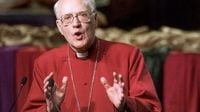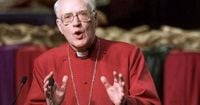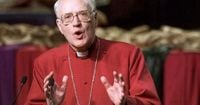History was made in London on October 3, 2025, as Sarah Mullally, the Bishop of London, was named the 106th Archbishop of Canterbury—the first woman ever to hold the Church of England’s most senior post. The announcement, delivered from Prime Minister Keir Starmer’s office with the formal consent of King Charles III, marks a watershed moment for the Church and the 85 million-strong Anglican Communion worldwide.
For centuries, the Church of England’s leadership was an all-male affair, stretching back to its founding in 597 AD. Mullally’s appointment, as reported by Reuters and the Associated Press, signals a dramatic shift in an institution often criticized for its slow pace of reform. Her elevation is possible thanks to changes introduced a decade ago under former Archbishop Justin Welby, which allowed women to be consecrated as bishops for the first time in the Church’s history.
“It would be incredibly exciting if the new Archbishop were a woman. That would be the first time in a history dating back to 597 AD... It would be momentous,” David Monteith, the Dean of Canterbury, told the BBC. Monteith, who will formally install Mullally in her seat of authority at Canterbury Cathedral in the coming months, captured the sense of anticipation and significance surrounding the appointment.
The selection process itself was anything but swift. Unlike the Roman Catholic Church’s conclave, which elected Pope Leo XIV in just 17 days earlier this year, the Church of England’s search for a new Archbishop stretched out over nearly eleven months. The process was overseen by a commission of 17 voting members, including five representatives from the global Anglican Communion, three from Canterbury, and six from the Church’s governing body. The commission was chaired by the former director-general of MI5, Britain’s domestic spy agency, a detail that underscores both the seriousness and the secrecy of the proceedings. There was no published shortlist, no open vote—just a painstaking vetting of candidates and quiet consultations with church stakeholders from across the world.
The field of candidates this year was notable for its diversity. Alongside Mullally, bookmakers and church-watchers tipped Rachel Treweek, the first female diocesan bishop in the Church of England, and Guli Francis-Dehqani, the Iranian-born Bishop of Chelmsford who came to Britain as a refugee after the 1979 Islamic Revolution. Other contenders included Martyn Snow, who stepped away from leading the Church’s process to bless same-sex couples, and Pete Wilcox, Bishop of Sheffield. The fact that women were not just in the running but leading the pack was itself hailed as a milestone for a church that only ordained its first female priests in 1994 and its first female bishop in 2015.
“And if you can have a female prime minister, you have a female monarch … why can’t you have the female archbishop of Canterbury?” asked George Gross, an expert on monarchy and modern religious thought at King’s College London, in comments to the Associated Press. “But it would be a very significant moment if it happens.”
Mullally steps into the role at a time of deep challenge and division for the Church of England and the wider Anglican family. She replaces Justin Welby, who resigned in November 2024 after an independent investigation found he failed to report serial physical and sexual abuse by a volunteer at Christian summer camps. The scandal, and others like it, have dogged the Church for more than a decade, eroding trust among the faithful and the public alike. “The new archbishop will be faced with declining church attendance, bloated management structures and clergy squabbling over what people do in the bedroom,” Andrew Graystone, an advocate for church abuse survivors, told Britain’s Press Association. “But the biggest challenge for the new archbishop is to restore trust after a decade of abuse scandals.”
The new Archbishop’s challenges do not end with the legacy of abuse. The Church remains riven by theological disputes over the treatment of women and LGBTQ people, and these divisions are magnified on the global stage. The Anglican Communion, which spans 165 countries and was shaped by the British Empire’s spread of Christianity, is a patchwork of cultures and convictions. Conservative churches in Africa, where homosexuality is outlawed in some places, have rejected Welby’s approach to same-sex relationships and believe only men should be consecrated as bishops. Meanwhile, more liberal voices in the West continue to push for greater inclusion and equality.
Groups like the Global Anglican Future Conference, which claims to represent the majority of Anglicans worldwide, have already voiced opposition to the idea of women bishops. At the same time, British campaigners such as Women and the Church argue there is still much progress to be made, publishing lists of parishes that limit women’s roles in ministry even as a woman ascends to the highest office.
The Archbishop of Canterbury’s role is unique: while each national Anglican church has its own leader, the Archbishop is considered “first among equals” and acts as the symbolic head of the worldwide Communion. The position’s global significance means that every decision made in London ripples out to churches from Nigeria to New Zealand, from the United States to Uganda. As Reuters noted, “Appointing a woman to the Archbishopric would be a defining moment for Christians across all denominations and continents, and is certain to deepen theological divides over the approach to same-sex couples and the role of women in the church.”
The monarchy’s involvement in the appointment process is another reminder of the Church’s unique place in British life. The formal consent of King Charles III, the Church’s supreme governor, and the announcement from the prime minister’s office reflect the enduring ties between church and state, a legacy of the 16th-century break with Rome under Henry VIII.
For many, Mullally’s appointment is a cause for celebration and hope—a sign that the Church of England is finally catching up with the modern world and embracing the gifts of all its members. For others, it is a moment of anxiety, as old certainties give way to new realities and the Church’s internal divisions are brought into sharper focus. Yet, as the dust settles on this historic announcement, one thing is clear: the Church of England, and the global Anglican Communion, are entering uncharted territory, led for the first time by a woman whose leadership will be watched closely by millions around the globe.
As Sarah Mullally prepares to take her seat at Canterbury, the eyes of the world—and the hopes and fears of Anglicans everywhere—will be upon her. The challenges are immense, but so too is the opportunity to reshape the church for a new era.



